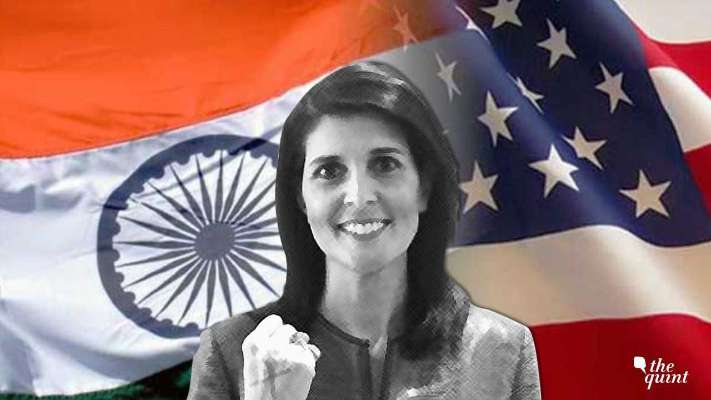Nikki Haley’s three-day visit to India – her first as a cabinet member of the Trump administration – is not only important for the ongoing bilateral engagement but also for marking the rise and rise of Indian Americans in the United States.
Navtej Sarna, India’s ambassador to the US, told The Quint that her visit had been in the pipeline for a couple of months. “It’s a natural visit for her. She has been involved in India-US relations and has been in close touch with us.”
Nikki Haley at Humayun’s Tomb, New Delhi
Sarna had hosted her for a lunch at his residence in January. “She is proud of her lineage, culture and values and hasn’t distanced herself from her Indian roots,” he says.
Haley will call on Prime Minister Narendra Modi and have a meeting with External Affairs Minister Sushma Swaraj, followed by dinner. She will give a speech at an Indian think-tank, Observer Research Foundation. If time and logistics permit, a walk through Old Delhi is also a possibility.
The Importance of Being Nikki Haley
Haley is no ordinary US ambassador to the United Nations but a close confidante of President Donald Trump, who negotiated and got her own sphere of influence before taking on the position.
She has Cabinet rank and a voice almost equal to that of Secretary of State Mike Pompeo. Pompeo’s predecessor Rex Tillerson, whose short tenure was riddled with controversies, was often outflanked by Haley on foreign policy issues.
What she says matters a great deal in this hard-to-decipher administration
Seen as one of the more effective and empowered members of Trump’s Cabinet, Haley has aggressively defended his agenda at the United Nations, often to the chagrin of her counterparts. She is a no-holds-barred representative who has thrived in this administration even though Trump and Haley came from somewhat different directions within the Republican Party.
A Well-Timed India Visit
Haley wanted to visit India in November 2017 along with Ivanka Trump for the Global Entrepreneurship Summit in Hyderabad, but somehow things didn’t work out. Perhaps, the White House wanted only one star at a time to shine.
Haley visited India last in 2014 for a multi-city trip to promote business ties while she was the governor of South Carolina. During a “really special and emotional” visit to the Golden Temple, she referred to India as her “second home.” Her parents belong to Amritsar.
It is significant that she is in New Delhi days before the inaugural 2+2 Dialogue – scheduled for 6 July in Washington – when Sushma Swaraj and Defence Minister Nirmala Sitharaman will meet Pompeo and Defence Secretary James Mattis, to discuss the next steps in the strategic partnership.
Swaraj and Haley have a chance to take full measure of the relationship, which has lately soured a bit, due to trade disputes.
Notably, according to a media advisory by the US Mission to the UN, Haley’s visit will “underscore the United States’ shared values and strong alliance with the people of India.” A bit of balm and good messaging before the 2+2 Dialogue can’t hurt.
The two women leaders are also likely to discuss the regional situation, UN issues, terrorism, and Afghanistan. Swaraj will get a first-hand account of the Trump administration’s priorities in the United Nations where Haley and India’s Permanent Representative – Syed Akbaruddin – regularly interact on issues and share a friendly equation.
US-India Ties & UN’s Role
Even though India has voted against the US on resolutions dearest to the Trump administration – the United States’ recognition of Jerusalem as Israel’s capital topping the list – New Delhi has largely escaped Haley’s wrath. She is known to have called out countries for trying to overstep the US.
Haley is, undoubtedly, one of the chief disrupters of Disrupter-in-Chief Trump. Last week, she announced the US was withdrawing from the UN Human Rights Council, a day after the UN High Commissioner for Human Rights, Zeid Ra’ad al-Hussein, criticised the Trump administration’s immigration policy.
He called the separation of children from their parents “unconscionable” and “an abuse.”
Haley shot back and condemned the council as a “cesspool of political bias”. The US has long accused the Council of being biased against Israel while shielding countries that clearly have a dark record.
Indian policy makers probably see some justification in this US walk-out. They have no love lost for al-Hussein who issued a highly controversial report on Kashmir earlier in June, which the government of India slammed as “fallacious, tendentious and motivated”.
Haley and Swaraj are sure to have congruent thoughts on al-Hussein, who seems to see all the ills of democracies but never notices abuses in autocratic systems. ‘Forced re-education camps’ in China for Muslims have clearly escaped his attention.
In the upside-down world of the UN Human Rights Council in Geneva, Chinese propaganda and language have also percolated into UN resolutions without a hint of embarrassment. But the US walkout gives the Chinese more space to push their agenda.
It might be a good idea for Swaraj to suggest that the Trump administration’s walk-outs – Paris Climate deal, Iran nuclear deal and the Human Rights Council – may give their rivals a free walk-in.








